US Housing and Credit Crisis- Why Keep Analyst X a Mystery?
Housing-Market / Credit Crisis 2008 Apr 04, 2008 - 12:18 PM GMTBy: Fake_Ben
 "The crisis from which we are now suffering is also the outcome of a credit expansion. The present crisis is the unavoidable sequel to a boom. Such a crisis necessarily follows every boom generated by the attempt to reduce the 'natural rate of interest.'" - Analyst X
"The crisis from which we are now suffering is also the outcome of a credit expansion. The present crisis is the unavoidable sequel to a boom. Such a crisis necessarily follows every boom generated by the attempt to reduce the 'natural rate of interest.'" - Analyst X
Do you have a troubled friend or relative whose misguided attempts to solve their problems only make the situation worse? As human beings, it is hard to see our own short-comings. But to ever truly solve our problems, we must strive to understand them.
As the financial crisis in America grows, politicians and pundits are proposing a variety of solutions, but have we arrived at a consensus on the problem? To some, the problem is Iraq. We are spending too much money there. To others, the problem is China and the competition from foreign labor. To others still, the problem is a shortage of oil, health care, or education. These issues are indeed problematic.
However, every modern financial crisis (Iceland today, Asia in the 1990s, the Nordic countries in the 1990s, Japan in 1989, etc., etc. etc.) has a striking similarity: a swift and dramatic rise in system-wide debt relative to GDP. Our own crisis is perhaps different only in its magnitude.
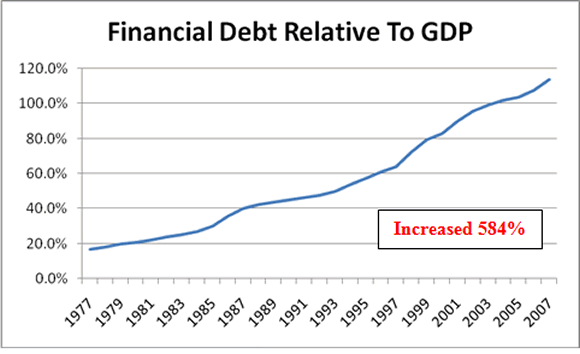
Source: U.S. Federal Reserve, Commerce Department
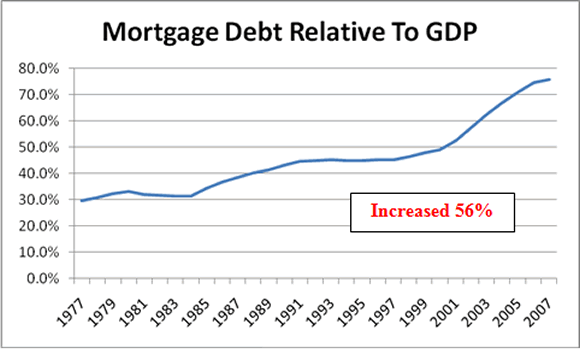
Source: U.S. Federal Reserve, Commerce Department
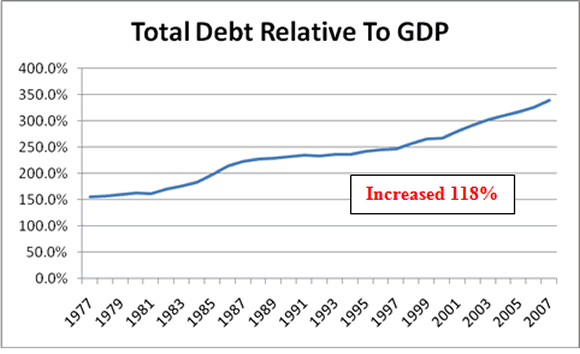
Source: U.S. Federal Reserve, Commerce Department
Considering that GDP (non-inflation-adjusted) grew 582% over the last 30 years, it is quite amazing that financial debt grew 584% relative to GDP. In nominal terms, domestic financial debt was $337.8 billion in 1977. By 2007, it was $15,751 billion. That is a gain of 4563%. Total domestic debt grew 1384%. Mortgage debt grew 1643%.
Throughout the years, the Fed has put forth many arguments to rationalize the growth of debt: excess liquidity is a result of Asian savings; financial innovations have allowed for more debt and faster GDP growth; asset growth has outpaced debt growth. While it may be appropriate for such arguments to be made by the private sector as it seeks to encourage more debt assumption, the fact that these arguments were being put forth by the Fed indicates a flaw in the current system. If the Fed was the institution justifying greater leverage, if the Fed was encouraging Americans to take on adjustable rate mortgages, if the Fed was its own apologist, what force in our society is the responsible counterbalance, the voice of reason encouraging a more sound financial sector, higher interest rates, and more savings with less debt?
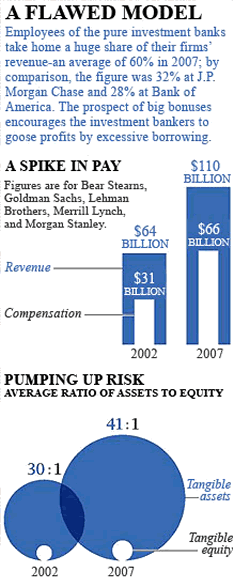 There are those that believe our modern economy is so evolved that concerns about debt levels are irrelevant. Their argument centers on the idea that "it's different this time." While "it's different this time" is comforting, a similar rational was used to justify the dot-com bubble and the housing bubble. Do we really want to bet the stability of our financial system and our economy on a similar conjecture? Are we 100% sure that we have broken the bounds of historical macroeconomic constraints? Some simple questions cast doubt on the "it's different" argument.
There are those that believe our modern economy is so evolved that concerns about debt levels are irrelevant. Their argument centers on the idea that "it's different this time." While "it's different this time" is comforting, a similar rational was used to justify the dot-com bubble and the housing bubble. Do we really want to bet the stability of our financial system and our economy on a similar conjecture? Are we 100% sure that we have broken the bounds of historical macroeconomic constraints? Some simple questions cast doubt on the "it's different" argument.
For example, if our economy can support more debt, then why are homeowners across the board having to dip into the equity of their homes to keep the momentum going? In the 1980s, homeowner equity represented nearly 70% of the value of a home.
By the end of 2007, it was only 47.9%. If our economy can support more debt, why does it seem to slow dramatically every time the Fed tries to raise interest rates? If there is so much solidity behind the economy, why is the Fed being forced to invoke Depression-era rules to bailout a broker/dealer that it fears could bring down the entire system?
Others claim "Yeah, I've been hearing this since the 1980s and we're still moving forward." However, it is clear our debt levels are starting to catch up with us. All one has to do is look at the performance of the stock market relative to commodities over the last 10 years. Companies like Microsoft and Intel are still trading lower than they were in the 90s. Even Warren Buffett's stocks have not done well.
But gold is up over 4 times and oil has gone up nearly 9 times. The only reason we're "still moving forward" is because of the massive stimulus that the government and the Fed have been injecting into the economy for nearly a decade now, but even that hasn't been enough to help the stock market! Imagine what the true market price of stocks would have been without this stimulus!
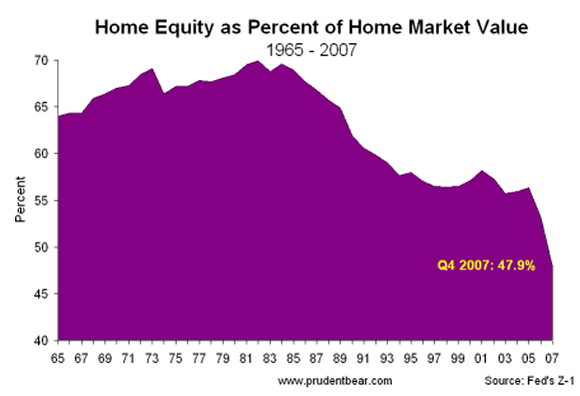
Some Fed apologists may try to characterize the institution as a victim, having been unable to control the debt being created outside of its purview. While there is some truth to this line of thinking, it misses the bigger problem: the Fed has the biggest system-wide tool to encourage savings and to limit debt. Yet, for the last 20 years, by consistently lowering interest rates, the Fed has been using this tool to encourage more debt. The Fed has also encouraged deregulation, changes in CPI calculations, changes in reserve requirements, and the use of derivatives --- all of which help add more debt and leverage into the system. In addition, most Fed officials have engaged in actions and bailouts that fostered moral hazard and created an environment of risky behavior, as investors openly talked about how the Fed would come to the rescue should anything go wrong. In the end, it appears these investors were correct in their estimation.
Many short-term solutions to our current problems will be proposed. Some will be helpful. Other will only make the long-term problem worse by adding more debt than GDP. If we are to avoid the problems of the past, any long-term solution must add checks and balances to the Fed's mandate to ensure appropriate levels of debt within our financial system. The Fed should be responsible stewards of the U.S. currency and conservative guarantors of the banking system.
So what does all this mean for our society and for investors?
According to Analyst X, "The sooner the credit expansion policy is brought to a stop, the less harm will have been done by the misdirection of entrepreneurial activity, the milder the crisis and the shorter the following period of economic stagnation."
For our society, it means a rethink of how we deal with our economy. We are like a steroid user. We keep pumping steroids into the economy to keep it going, but it continues to damage our long-term health, and it requires more and more artificial stimulus. To date, the solutions are more of the same: lower interest rates, more government encouraged debt via Fannie and Freddie and the FHA, more help for banks and homebuilders. More steroid use will only make the damage worse. What kind of position do we put ourselves in if the world economy continues to drive up commodity prices, if inflation creeps into more of the economy, and the dollar continues to fall? If the game turns from stimulating the economy to competitive interest rates increases to contain inflation and attract capital, will the U.S. be able to compete?
Long term, the solution is to return to a market-based economy, wherein the Fed does not artificially encourage low interest rates via government intervention. Short term, the solution might be a large, quick bailout given directly to each U.S. taxpayer, which would be highly inflationary, but would allow debt to be paid down. This solution seems more just than the piecemeal and special-interest-driven favors that keep trickling out of Congress. Furthermore, the U.S. taxpayers could use their money to reduce debt, rather than the steps currently being proposed that create more debt.
For investors, the solution is more of the same: commodities. As long as the Fed and Congress continue to use more steroids and encourage more misallocation of resources into banking and housing and debt, investors need to protect their wealth and purchasing power through gold, oil, and agriculture commodities. With stories of food shortages and hoarding springing up across the globe, agricultural commodities are the best bet. The Rogers Agriculture Total Return index (Symbol RJA) is a great way for average investors to invest directly in these commodities.
So why keep Analyst X a mystery? What does he know about a worldwide economic crisis? Well, a lot, given that he lived through the Great Depression. All the above quotes are from 1931. His name: Ludwig von Mises. Plus ca change, plus c'est la meme chose.
Please visit FakeBen.com to learn more about these problems and the rising threat inflation poses to your wealth. While the Fed might be hurting the U.S. economy, they don't have to hurt you. There are many ways to protect your wealth and to prosper.
For those interested, here are some more of Ludwig von Mises' quotes:
"The point of view prevails generally among politicians, business people, the press and public opinion that reducing the interest rates below those developed by market conditions is a worthy goal for economic policy, and that the simplest way to reach this goal is through expanding bank credit. Under the influence of this view, the attempt is undertaken, again and again, to spark an economic upswing through granting additional loans. At first, to be sure, the result of such credit expansion comes up to expectations. Business is revived. An upswing develops. However, the stimulating effect emanating from the credit expansion cannot continue forever. Sooner or later, a business boom created in this way must collapse."
The current economic system "is rejected unanimously today by all political parties and governments. No similar agreement may be found with respect to what economic system should replace it in the future."
"All attempts to emerge from the crisis by new interventionist measures are completely misguided. There is only one way out of the crisis: Forego every attempt to prevent the impact of market prices on production. Give up the pursuit of policies which seek to establish interest rates, wage rates and commodity prices different from those the market indicates. This may contradict the prevailing view. It certainly is not popular. Today all governments and political parties have full confidence in interventionism and it is not likely that they will abandon their program. However, it is perhaps not too optimistic to assume that those governments and parties whose policies have led to this crisis will some day disappear from the stage and make way for men whose economic program leads, not to destruction and chaos, but to economic development and progress."
By Charles Zentay
http:// www.FakeBen.com
FakeBen is a blog to monitor the Fed and its actions and encourage community participation. At FakeBen, we believe that the Fed policy of the last two decades has created a credit bubble as large as that created in the 1920s. This bubble will lead to either inflation, a recession, or both.
We believe that the Fed's policy of lowering interest rates to encourage more credit creation is misguided, will eventually lead to 0% interest rates, and will not solve the long-term problem, which is too much credit relative to GDP.
Copyright © 2008 by Charles Zentay. All rights reserved.
Disclaimer: The above is a matter of opinion and is not intended as investment advice. Information and analysis above are derived from sources and utilizing methods believed reliable, but we cannot accept responsibility for any trading losses you may incur as a result of this analysis. Do your own due diligence.
Fake Ben Archive |
© 2005-2022 http://www.MarketOracle.co.uk - The Market Oracle is a FREE Daily Financial Markets Analysis & Forecasting online publication.



